Tour de France 2014: Keeping the Belkin team wheels turning
- Published
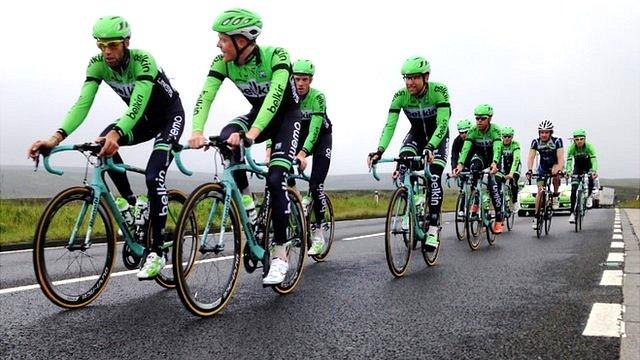
The chef for the Belkin cycling team is explaining one of the unusual food ingredients which it is hoped will give its riders an extra edge in this year's Tour de France.
"Beetroot," declares Jesper Boom, and goes on to explain why the purple root vegetable can help give the Amsterdam-based team's riders a crucial advantage in each race stage.
"Beetroot has high nitrate content, which helps the muscles to use oxygen more efficiently," he says.
It is one of his catering tasks to ensure in advance that there are adequate supplies of beetroot at each of the hotels the team stays at.
"If beetroot is not on their regular menu then I ask them to go and buy it specifically for us, so that it is ready for our arrival."
'Travelling circus'
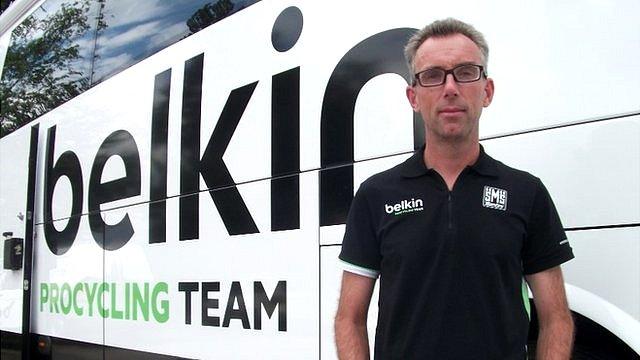
Louis Delahaye makes sure the team is in peak physical and psychological condition
Dutchman Boom is the younger brother of the team's renowned rider Lars Boom, and has worked with Belkin Pro Cycling- recently known as Rabobank and then Blanco - for two years.
The large behind-the-scenes operations which support a football World Cup or Formula One racing team are well-known, but a Tour de France team also needs major support.
Jesper, 26, is just one of some 20 backroom staff beavering tirelessly away to ensure that everything possible is done to give the Belkin team's nine riders the best chance of success in the race.
As he talks to the BBC website, other members of staff, all decked out in matching black polo shirts buzz about the team's hotel lobby, co-ordinating their many daily tasks in support of the riders.

Belkin Tour de France team
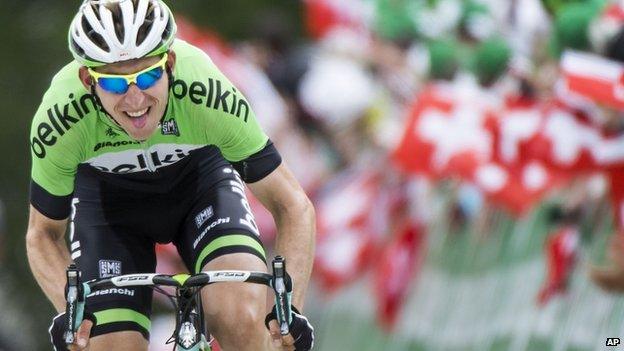
9 cyclists
5 soigneurs (carers)
4 coaches
3 mechanics - with the option of a fourth
2 hospitality/commercial staff
1 chef
1 doctor
1 osteopath
1 communications manager
1 director of cycling/MD
1 person to look after transport and hotel bookings

It comes at an uncertain time for the team, with title sponsor Belkin pulling out at the end of the year, and the hunt for a new major backer under way.
But there is no sign of any slacking, as the team members gear up to work 16-hour days for the next three weeks.
Team Belkin mechanic Vincent Hendriks shows how Tour de France racing bike tyres are made
"A Tour de France team is like a large travelling circus," says Louis Delahaye, one of the team's four sports coaches, who has the specific role of high performance manager.
"The public only sees the riders but they could not function without the unseen support staff."
This solid base to the team's cycling pyramid includes everything from osteopaths to mechanics, from logistics staff to PR people.
How to set up a Tour de France bike's saddle and handlebars
Ice vests
Delahaye's main task is to ensure that his riders are in peak physical, nutritional and psychological condition.
More specifically it can mean deciding which snack bars to give the cyclists before, during and after race stages.
Meanwhile, technical tasks include ensuring there are scientifically-based cooling regimes in place for the riders, not only after race stages, but also pre-cooling cyclists before time trials.
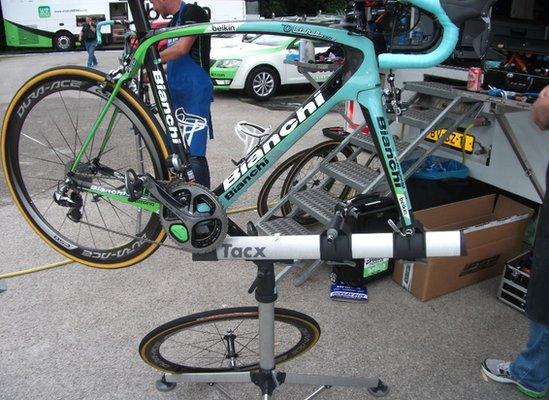
One of the high-tech Belkin bikes being used on the UK stages of the Tour
While leg muscles are warmed, core body temperature is lowered by giving the riders ice vests to wear ahead of the start.
Another essential duty is to make sure that the riders are properly rested, a task achieved by transporting each individual cyclist's personal mattress from team hotel to hotel each day throughout the race.
'Rock band'
If Delahaye sees the team as a circus, soigneur (French for "one who provides care") Richard Cremers sees a Tour de France team on the road as being more akin to a major music act.
He is one of the essential assistants responsible for a range of duties including feeding, clothing, massaging and escorting riders.
"If you don't like cycling you really shouldn't do this job. It is very long hours, but very exciting too," says the 50-year-old. "It is a bit like being on a rock band tour, lots of logistics and a different town or city each day."
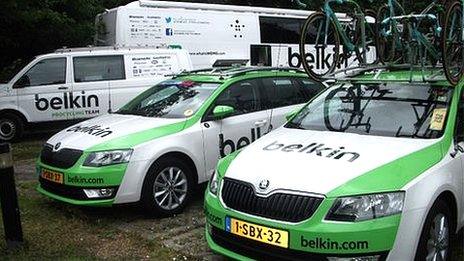
A selection of the Belkin team's motorised convoy
The team's huge truck, coach, three vans and five cars certainly resemble the sort of travelling convoy more associated with an international music act.
'Roller-coaster ride'
The ultimate responsibility for ensuring the team is as successful as possible in the race, while also keeping the show on the road, falls to the team's director of cycling and managing director Richard Plugge.
At present the 44-year-old also has the pressure of finding a new title sponsor.
"Being director of cycling is a real roller-coaster ride, but I like roller-coaster," he says. "I don't walk away from challenges.
"I am really confident we will get a replacement sponsor, because cycling is one of the biggest sports, particularly in Western Europe," he says. "It is also big in California, and growing in Australia and China, particularly the latter."

Belkin Tour de France supplies
11 mattresses
36 aero suits, 45 bib shorts, 54 race jerseys, 250 podium caps
63 bikes
140 wheels, 220 tyres
250 feeding bags, 3,000 water bottles
2,190 nutrition gels, 3,800 nutrition bars
10 jars of peanut butter, 10 boxes of chocolate sprinkles, 20 bags of wine gums, 20 jars of jam
80 kg of nuts, raisins, apricots and figs, plus 50 kg of cereals

In the longer term Plugge says that the funding model has to change for Tour de France teams, away from its present sponsor-heavy financial set-up.
And he has a clear vision of the new sort of economic arrangement he would like to see.
This includes selling merchandising to fans as well as selling the experience of meeting the team's riders. Selling rider data and image rights is also a possibility.
In addition he says the sport is ripe for wealthy individuals to pump in money, in a similar way as seen in football over the past decade.
He says there is a place for sponsors, who are important, but not so that teams are as heavily dependent on them as they are now.
"We have seen the sport suffer somewhat in previous years but I think we will see a great change economically in cycling in the next three to five years," he says.